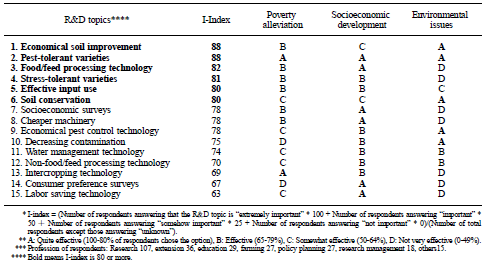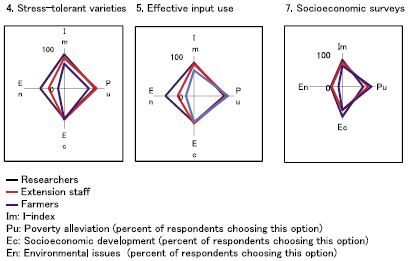Analyzing priorities for agricultural R&D in Asian developing countries
Description
To support policy planners in deciding how to allocate resources for R&D activities in an appropriate manner, a questionnaire survey was conducted in eight Asian countries (Bangladesh, India, Indonesia, Lao People’s Democratic Republic, Myanmar, Sri Lanka, Thailand, and Vietnam) in 2005. The survey was designed to reveal the importance and expected effects of 15 R&D topics concerning agriculture and was designed based on the survey used for the Technology Forecast Survey, conducted by the Ministry of Education, Culture, Sports, Science and Technology of the Government of Japan. The 15 R&D topics were collected from the list of research subjects proposed by the researchers in their respective countries based on surveys and analyses of current constraints on agricultural development in the countries. From the overall list, the 15 most frequent topics were selected for this survey that seemed to represent problems common to the region and which could significantly contribute to poverty alleviation in rural areas. The collaborators were asked to select respondents for the survey who worked in the field of agricultural technological development, including extension staff and farmers as well as researchers.
Table 1 shows the I-index of all the surveyed R&D topics, which reveals the priority of each R&D topic, calculated using the answers of all the 259 respondents from the eight countries. While the development of labor-intensive (= materialsaving) technologies such as “Economical soil improvement,” “Pest-tolerant varieties,” and “Effective input use” received a higher I-index, “labor-saving technology” received a lower I-index.
Out of six R&D topics which received an I-index of 80 or more, “Pest-tolerant varieties” was the only topic recognized as effective for all three outcomes, namely “Poverty alleviation,” “Socio economic development,” and “Environmental issues.” “Economical soil improvement” and “Soil conservation” were recognized as quite effective in “Environmental issues” while “Poverty alleviation” and “Socioeconomic development” scored relatively lower. “Food/feed processing technology,” “Stresstolerant varieties” and “Effective input use” were recognized as effective in improving rural welfare both on a short- and longterm basis with fewer expected environmental issues.
Fig. 1 shows that while 60% of researchers anticipate the development of “Stress-tolerant varieties” to have a positive impact on environmental problems, only 39% of extension staff and 15% of farmers felt the same. It is necessary for researchers to put more effort into practical application of the technology to win trust in technology development on the part of farmers and extension staff. The difference between researchers and farmers regarding “Effective input use” can also be attributed to the respondents’ expectations of how technology can contribute to solving environmental problems. Researchers focus on overuse of input, while farmers without access to adequate input supplies gave this a lower priority. While researchers gave more priority than farmers to “Socioeconomic surveys,” farmers had higher hopes of a positive impact on poverty alleviation from this subject than researchers. It has been shown that researchers are less confident that the conclusions of a socioeconomic study can contribute to poverty alleviation, although they admit the importance of socioeconomic studies in general. More attention should be paid to promoting socioeconomic studies that can result in actual beneficial impacts on the welfare of the rural poor, as well as producing scientific findings.
Figure, table
-
Table 1. Importance index (I-index)* and expected effects** of 15 R&D topics (Respondents*** = 259).
-
Fig. 1. I-index and expected effects on R&D topics by respondents' occupation.
- Affiliation
-
Development Research Division
- Classification
-
Technical B
- Term of research
-
FY2005(FY2003~2005)
- Responsible researcher
-
SUGINO Tomohide ( Development Research Division )
- ほか
- Publication, etc.
-
Tomohide Sugino (2006): Prioritization of technological development goals for poverty alleviation through sustainable and diversified agriculture, Asia-Pacific development journal, 13(2), pp.25-55.
- Japanese PDF
-
2006_seikajouhou_A4_ja_Part3.pdf556.29 KB


